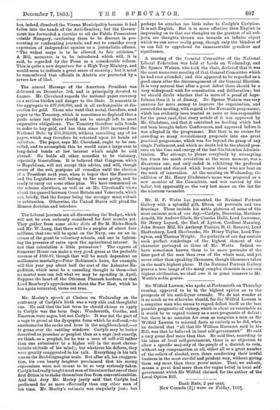Mr. Morley's speech at Chelsea on Wednesday on the centenary
of Carlyle's birth was a very able and thoughtful one. He said that the last term he should choose to apply to Carlyle was the term Sage; Wordsworth, Goethe, and Emerson were sages, but not Carlyle. It was not the part of a sage to growl at the dyspepsia from which he suffered,—to anathematise the cocks and hens in the neigtbourhood,—or to groan over the rattling windows. Carlyle may be better described as preacher or prophet than as a sage [not exactly, we think, as a prophet, for he was a man of self-will rather than one submissive to a higher will in the -most charac- teristic attitude of his mind]; but whatever his defects, they were greatly exaggerated in his talk. Everything in his talk was on the Brobdingnagian scale. But after all, his exaggera- tion, his own hearty laughter proclaimed that his strong expressions were not meant to be so very seriously taken. Carlyle had really taught most men of literature that one of their first duties is to shake themselves free from conventionalities. And that duty Mr. Morley justly said that Carlyle had performed for us more effectually than any other man of his time. Mr. Morley's estimate was singularly just; but
perhaps be attaches too little value to Carlyle's Carlylese. It is not English. But it is more effective than English in impressing on us that our thoughts on the greatest of all sub- jects, are thoughts thrown out towards an infinite object which we can never really grasp, though only the blindest of us can fail to apprehend its immeasurable grandeur and significance.






















































 Previous page
Previous page